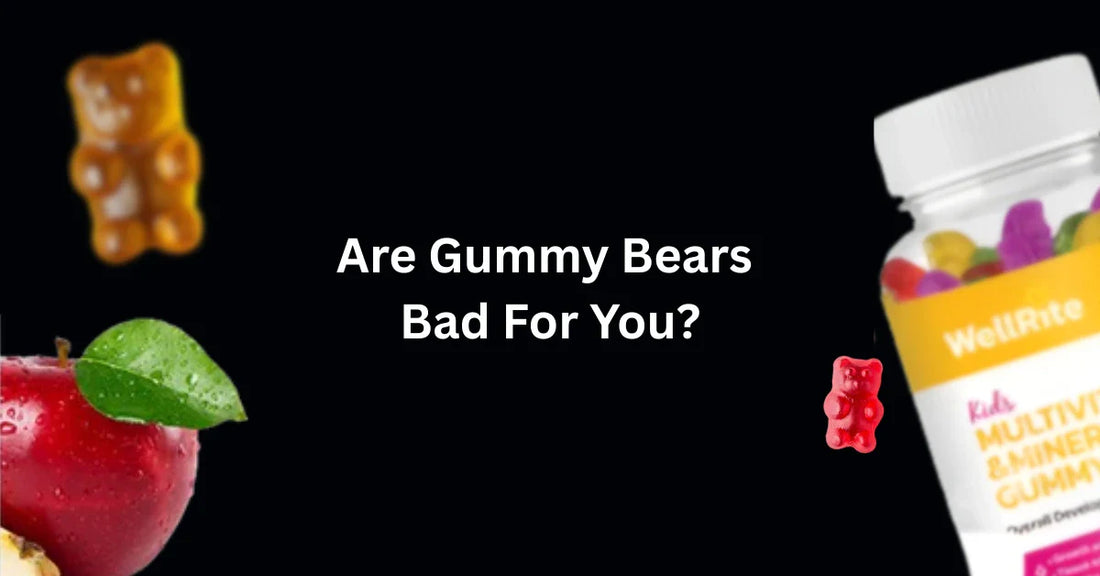
Are Gummy Bears Bad For You?
Share
Gummy bears are a fun, chewy, and colorful candy that almost everyone has tried at some point.
But with increasing concerns about sugar and processed foods, many people wonder: Are gummy bears bad for you?
The answer isn’t a simple yes or no. It depends on several factors including how often you consume them, what ingredients are used, and whether you're eating them as an occasional treat or a daily habit.
In this article, we'll break down the nutritional content of gummy bears, explore their effects on health, and provide guidance on how to enjoy them responsibly.
What Are Gummy Bears Made Of?
The typical gummy bear is made with a combination of the following ingredients:
-
Sugar and Corn Syrup: These are the main ingredients and give gummy bears their sweet flavor.
-
Gelatin: A protein derived from animal collagen that gives gummies their signature chewiness.
-
Food Coloring and Artificial Flavors: These enhance the candy’s appearance and taste.
-
Citric Acid: Sometimes added for a sour tang.
Some brands also add:
-
Natural fruit juice concentrates
-
Vitamins (in the case of gummy supplements)
Nutritional Profile of Gummy Bears
A small handful (about 17 pieces) of traditional gummy bears contains:
-
140 calories
-
22–30 grams of sugar
-
0 grams of fat
-
Little to no protein or fiber
Though low in fat, gummy bears are high in sugar and empty calories, offering no real nutritional value.
Health Concerns of Eating Gummy Bears
1. High Sugar Content
The biggest concern is sugar. Eating too many gummy bears regularly can lead to:
-
Weight gain
-
Blood sugar spikes
-
Increased risk of diabetes
-
Dental cavities
2. Artificial Additives
Many gummy bears are colored with artificial dyes like Red 40 and Yellow 5, which some studies have linked to hyperactivity in children and allergic reactions in sensitive individuals.
3. Gelatin Sensitivity
While gelatin is generally safe, some people with dietary restrictions (like vegans or certain religious diets) may want to avoid it.
Are Sugar-Free Gummy Bears Healthier?
Sugar-free gummy bears might seem like a healthier alternative, but they often contain sugar alcohols like maltitol or sorbitol, which can cause digestive issues such as:
-
Gas
-
Bloating
-
Diarrhea (especially when consumed in large quantities)
So while they cut out sugar, they may introduce other concerns if not eaten in moderation.
Frequently Asked Questions:
Q 1. Can gummy bears cause weight gain?
Yes, consuming gummy bears frequently due to their high sugar and calorie content can contribute to weight gain, especially when combined with a sedentary lifestyle.
Q 2. Are gummy bears okay for kids?
In moderation, yes. However, parents should monitor portion sizes and opt for options with fewer artificial ingredients or consider vitamin-enriched versions.
Q 3. Are there healthier alternatives to regular gummy bears?
Yes. Some brands offer organic, low-sugar, or vegan gummy bears made with fruit juice, plant-based gelatin, and natural colors.
Final Thoughts:
So, are gummy bears bad for you? Not inherently—but they’re not healthy either. Like most candies, gummy bears are best enjoyed in moderation. Eating them occasionally as a treat is fine, but making them a regular part of your diet can lead to various health concerns, especially related to sugar and artificial additives.
If you enjoy the chewy texture and fruity flavors, consider switching to health-conscious alternatives or even gummy vitamins that provide some nutritional benefits. As always, balance and moderation are key to maintaining a healthy lifestyle.



